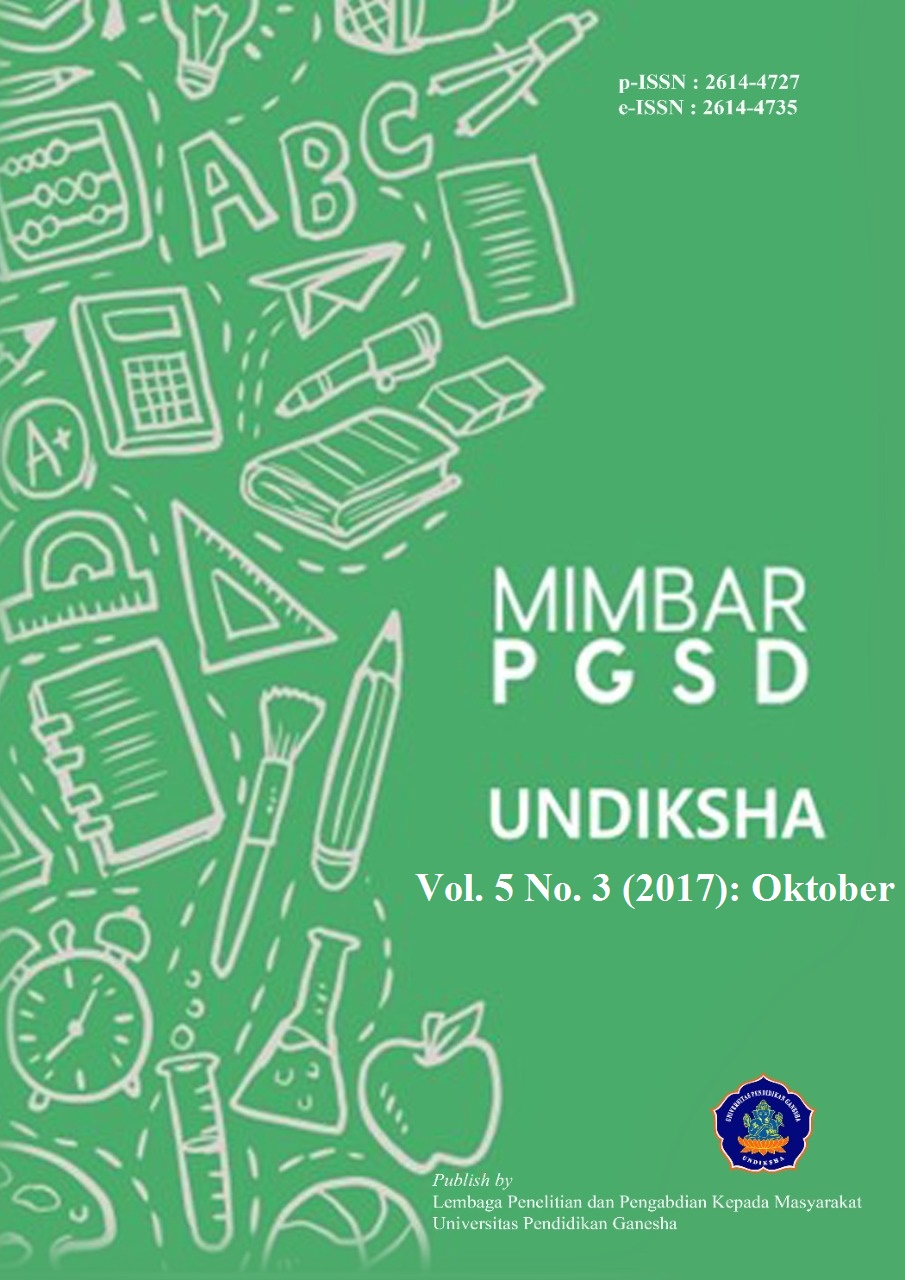PENGARUH MODEL PEMBELAJARAN KOOPERATIF TIPE TALKING STICK TERHADAP KOMPETENSI PENGETAHUAN IPA SISWA KELAS V SD GUGUS KAPTEN KOMPYANG SUJANA TAHUN AJARAN 2016/2017
DOI:
https://doi.org/10.23887/jjpgsd.v5i3.12426Abstract
Penelitian ini bertujuan untuk mengetahui perbedaan yang signifikan kompetensi pengetahuan IPA antara siswa yang dibelajarkan dengan model pembelajaran kooperatif tipe talking stick dan siswa yang dibelajarkan dengan model pembelajaran konvensional pada siswa kelas V SD Gugus Kapten Kompyang Sujana Tahun Ajaran 2016/2017. Penelitian ini tergolong quasi experiment dengan rancangan non-equivalent control group design. Populasi dalam penelitian ini adalah SD Gugus Kompyang Sujana dengan jumlah 668 orang. Sampel ditentukan dengan teknik random sampling. Sampel dalam penelitian ini adalah siswa kelas V SD 9 Padang Sambian dengan jumlah 40 orang dan siswa kelas V SD 1 Padang Sambian dengan jumlah 38 orang, sehingga jumlah sampel penelitian sebanyak 78 orang. Data yang dikumpulkan dianalisis menggunakan metode analisis statistik deskriptif dan uji-t. Hasil uji-t diperoleh thitung = 3,04 dan ttabel = 2,00 pada taraf signifikansi 5% dengan dk = 76, dengan membandingkan hasil thitung dengan ttabel dapat disimpulkan bahwa thitung > ttabel, maka H0 ditolak dan Ha diterima, sehingga hasil penelitian menunjukkan bahwa terdapat perbedaan yang signifikan kompetensi pengetahuan IPA antara siswa yang dibelajarkan dengan model pembelajaran kooperatif tipe talking stick dan siswa yang dibelajarkan dengan model pembelajaran konvensional pada siswa kelas V SD Gugus Kapten Kompyang Sujana Tahun Ajaran 2016/2017.Kata Kunci : kompetensi pengetahuan IPA, talking stick, model pembelajaran konvensional
This study aims to determine the significant difference of science knowledge competence between students who are taught by cooperative learning model of talking stick type and the students who are taught by conventional learning model in grade V students SD Gugus Kapten Kompyang Sujana Academic Year 2016/2017. This research is classified as quasi experiment with non-equivalent control group design. The population in this study is SD Gugus Kapten Kompyang Sujana with a total of 668 people. The sample is determined by random sampling technique. The sample in this research is the students of class V SD 9 Padang Sambian with the number of 40 people and students of grade V SD 1 Padang Sambian with the number of 38 people, so the number of research samples are 78 people. The data collected were analyzed using descriptive statistical analysis method and t-test. The result of t-test is obtained tcount = 3.04 and ttable = 2.00 at 5% significance level with dk = 76, by comparing tcount result with ttable it can be concluded that tcount > ttable, then H0 is rejected and Ha accepted, so the result show that there is a significant difference of science knowledge competence between students who are taught by cooperative learning model of talking stick type and students who are taught by conventional learning model in grade V students of SD Gugus Kapten Kompyang Sujana Academic Year 2016/2017.
keyword : science knowledge competence, talking stick, conventional learning model
Published
2017-10-29
How to Cite
., I. K. W. S. A., ., D. I. N. S. M., & ., D. S. P. M. (2017). PENGARUH MODEL PEMBELAJARAN KOOPERATIF TIPE TALKING STICK TERHADAP KOMPETENSI PENGETAHUAN IPA SISWA KELAS V SD GUGUS KAPTEN KOMPYANG SUJANA TAHUN AJARAN 2016/2017. MIMBAR PGSD Undiksha, 5(3). https://doi.org/10.23887/jjpgsd.v5i3.12426
Issue
Section
Articles
License
Authors who publish with the Mimbar PGSD Undiksha agree to the following terms:
- Authors retain copyright and grant the journal the right of first publication with the work simultaneously licensed under a Creative Commons Attribution License (CC BY-SA 4.0) that allows others to share the work with an acknowledgment of the work's authorship and initial publication in this journal.
- Authors are able to enter into separate, additional contractual arrangements for the non-exclusive distribution of the journal's published version of the work (e.g., post it to an institutional repository or publish it in a book), with an acknowledgment of its initial publication in this journal.
- Authors are permitted and encouraged to post their work online (e.g., in institutional repositories or on their website) prior to and during the submission process, as it can lead to productive exchanges, as well as earlier and greater citation of published work. (See The Effect of Open Access)













